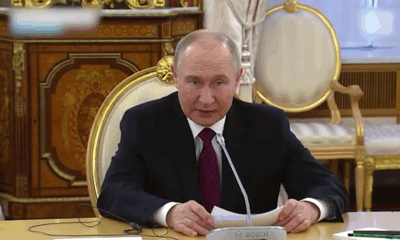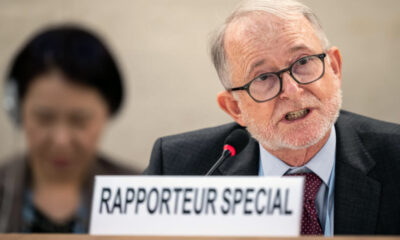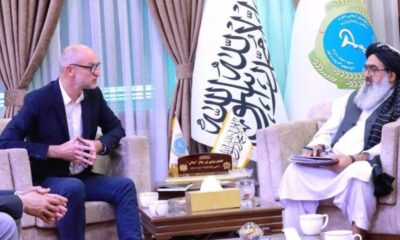Regional
Shehbaz Sharif wins Pakistan’s top job for second time
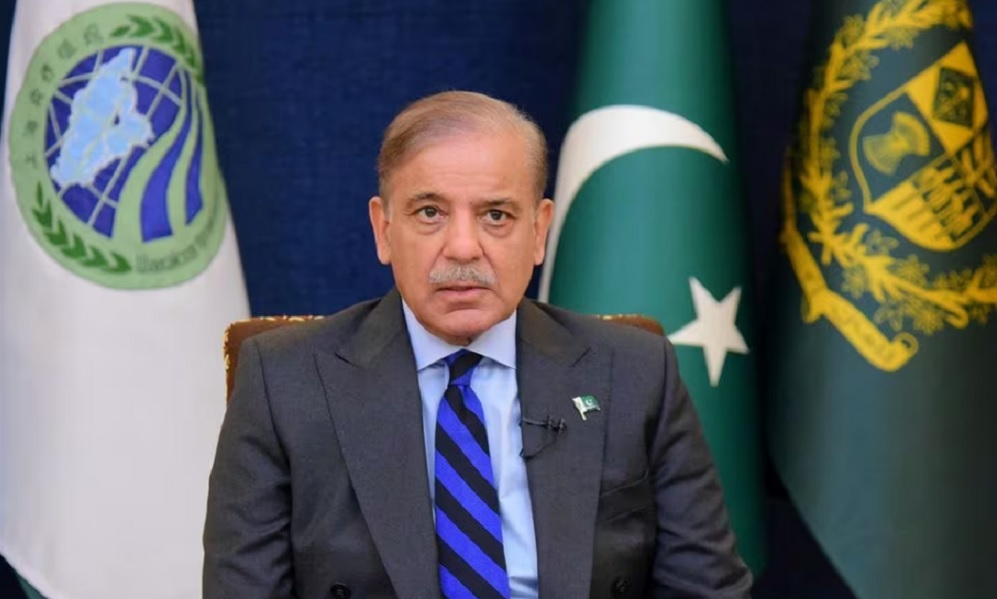
Shehbaz Sharif, returning as Pakistan’s prime minister for a second time on Sunday when his brother declined a fourth term, has played a crucial role holding together a disparate coalition for 16 months after rival Imran Khan was ousted.
Sharif, 72, won a parliamentary vote for premier, resuming the role he had held until August when parliament was dissolved ahead of last month’s elections. Pakistan has had a caretaker government since then.
He was named by his party and coalition allies to head the South Asian nation, despite his elder brother Nawaz Sharif winning a seat in the assembly and being favourite to be sworn in again.
Nawaz Sharif did not want to run a minority coalition government, having had clear majorities in his three previous stints as prime minister, his daughter Maryam said in a post on X.
The brothers’ Pakistan Muslim League-Nawaz (PML-N) party won only 80 of the 264 seats up for contest in the elections but was supported by other parties for a majority.
In addition to holding the coalition together after Khan was voted out in 2022, Shehbaz Sharif helped Pakistan secure a last-gasp International Monetary Fund (IMF) bailout last year.
He regained the top job as the PML-N buried differences with the powerful military in the face of their common rival, Khan, who was at odds with top generals over policy differences.
At the time, Nawaz Sharif was in self-imposed exile in London and disqualified from holding public office. He returned to Pakistan in October.
Before his stint as prime minister, the younger Sharif was known more as an administrator than a politician, having served as chief minister thrice in the country’s largest province, Punjab.
But as prime minister, he quickly took on the role of peacemaker between coalition parties often at odds with one another over key policies.
Shehbaz Sharif’s biggest achievement in his short tenure was clinching the IMF bailout with Pakistan on the brink of a debt default. The deal was signed after Sharif personally called on IMF chief Kristalina Georgieva in June.
However, under his government, inflation touched a high of 38% with record depreciation of the rupee currency – mainly due to structural reforms necessitated by the IMF programme to stabilise the economy.
He blames the economic meltdown on Khan’s government, which he says broke an agreement with IMF just before he was ousted. Sharif said his government had to introduce a slew of reforms and scrap subsidies, causing inflation to surge. – Reuters
Regional
India PM Modi warns Pakistan of more strikes if there is a ‘terrorist attack’
Modi’s address came hours after the military operations chiefs of India and Pakistan spoke by phone, two days after they agreed to the ceasefire.

Indian Prime Minister Narendra Modi warned Pakistan on Monday that New Delhi would target “terrorist hideouts” across the border again if there were new attacks on India and would not be deterred by what he called Islamabad’s “nuclear blackmail”, Reuters reported.
Modi’s first public comments since Indian armed forces launched strikes on what New Delhi said were “terrorist camps” across the border last week indicated a hardening of India’s position on ties with its neighbour, which were icy even before the latest fighting.
Pakistan denies Indian accusations that it supports militants who attack it and says the locations hit by India last week were civilian sites.
Modi was speaking two days after the nuclear-armed neighbours agreed to a ceasefire, announced by U.S. President Donald Trump.
The truce was reached after four days of intense exchanges of fire as the old enemies targeted each other’s military installations with missiles and drones, killing dozens of civilians.
The military confrontation began on Wednesday, when India said it launched strikes on nine “terrorist infrastructure” sites in Pakistan and Pakistani Kashmir following an attack on Hindu tourists by Islamist militants in Indian Kashmir last month that killed 26 men.
Islamabad denied any links to the attack and called for a neutral investigation.
“If there is a terrorist attack on India, a fitting reply will be given… on our terms,” Modi said, speaking in Hindi in a televised address. “In the coming days, we will measure every step of Pakistan… what kind of attitude Pakistan will adopt.”
“India will strike precisely and decisively at the terrorist hideouts developing under the cover of nuclear blackmail,” he said, and listed New Delhi’s conditions for holding talks with Islamabad and lifting curbs imposed after the Kashmir attack.
“India’s position is clear: terror and talks cannot go together; terror and trade cannot go together. And water and blood cannot flow together,” he said, referring to a water sharing pact between the two countries New Delhi suspended.
There was no immediate response to his comments from Islamabad.
Hindu-majority India and Muslim Pakistan both rule part of the Himalayan region of Kashmir, but claim it in full. They have fought two of their three wars since independence in 1947 over the region and there have been several other more limited flare-ups, including in 2016 and 2019, read the report.
The latest military conflict between the South Asian neighbours spiralled alarmingly on Saturday and there were briefly fears that nuclear arsenals might come into play as Pakistan’s military said a top body overseeing its nuclear weapons would meet.
But the Pakistani defence minister said no such meeting was scheduled.
Military analysts said this may have been Pakistan’s way of hinting at its nuclear option as Islamabad has a “first-use” policy if its existence is under threat in a conflict.
Modi’s address came hours after the military operations chiefs of India and Pakistan spoke by phone, two days after they agreed to the ceasefire.
“Issues related to continuing the commitment that both sides must not fire a single shot or initiate any aggressive and inimical action against each other were discussed,” the Indian army said.
“It was also agreed that both sides consider immediate measures to ensure troop reduction from the borders and forward areas,” it added.
There was no immediate Pakistani readout of the military operations chiefs’ talks.
In Washington, Trump said the leaders of India and Pakistan were “unwavering”, and the U.S. “helped a lot” to secure the ceasefire, adding that trade was a “big reason” why the countries stopped fighting.
“We are going to do a lot of trade with Pakistan… and India. We are negotiating with India right now. We are soon going to negotiate with Pakistan,” he said, just ahead of Modi’s speech.
Pakistan has thanked the U.S. for brokering the ceasefire while India, which opposes third-party involvement in its disputes with Pakistan, has not commented on Washington’s role.
Pakistan’s international bonds rallied sharply on Monday, adding as much as 5.7 cents in the dollar, Tradeweb data showed.
Late on Friday, the International Monetary Fund approved a fresh $1.4-billion loan and also the first review of its $7-billion programme, Reuters reported.
Pakistan’s benchmark share index (.KSE), closed up 9.4% on Monday, while India’s blue-chip Nifty 50 (.NSEI), index closed 3.8% higher in its best session since February 2021.
In Beijing the foreign ministry said China, which also controls a small slice of Kashmir, was willing to maintain communication with both its neighbours, and play a “constructive role in achieving a comprehensive and lasting ceasefire” and maintaining peace.
India blames Pakistan for an insurgency in its part of Kashmir that began in 1989, but Pakistan says it provides only moral, political and diplomatic support to Kashmiri separatists.
Regional
Indian air force says losses are part of combat but all pilots back home
A Pakistani military spokesperson told Reuters on Wednesday that five Indian aircraft had been shot down, but the claim was not confirmed by India.

The Indian Air Force said on Sunday that “losses are a part of combat” without giving details but added that all its pilots were back home after fighting with Pakistan this week, responding to a question on whether the force suffered losses.
A Pakistani military spokesperson told Reuters on Wednesday that five Indian aircraft had been shot down, but the claim was not confirmed by India.
Also on Wednesday, four government sources in Indian Kashmir told Reuters that three fighter jets crashed in the federal territory, hours after India said it struck nine Pakistani “terrorist infrastructure” sites across the border.
A ceasefire appeared to hold on Sunday between India and Pakistan, hours after the nuclear-armed rivals accused each other of violating a truce that brought them back from the brink of all-out war.
The ceasefire was agreed on Saturday after four days of missile, drone and artillery attacks which killed at least 60 people and sent thousands fleeing, in the worst violence since India and Pakistan’s last open conflict in 1999.
Regional
Putin proposes direct peace talks with Ukraine after three years of war
President Volodymyr Zelenskiy’s office and Ukraine’s foreign ministry did not immediately respond to Reuters’ request for comment on the proposal.

Russian President Vladimir Putin on Sunday proposed direct talks with Ukraine on May 15 in Turkey that he said should be aimed at bringing a durable peace, an initiative welcomed by U.S. President Donald Trump, Reuters reported.
Putin sent thousands of troops into Ukraine in February 2022, unleashing a war that has left hundreds of thousands of soldiers dead and triggering the gravest confrontation between Russia and the West since the 1962 Cuban Missile Crisis.
The Russian leader, who has offered few concessions towards ending the conflict so far, said the talks in the Turkish city of Istanbul will be aimed at eliminating the root causes of the war and restoring a “long-term, lasting peace” rather than simply a pause for rearmament.
“We are proposing that Kyiv resume direct negotiations without any preconditions,” Putin said from the Kremlin in the early hours of Sunday. “We offer the Kyiv authorities to resume negotiations already on Thursday, in Istanbul.”
Putin said that he would speak to Turkish President Tayyip Erdogan later on Sunday about facilitating the talks, which he said could lead to a ceasefire.
“Our proposal, as they say, is on the table. The decision is now up to the Ukrainian authorities and their curators, who are guided, it seems, by their personal political ambitions, and not by the interests of their peoples.”
President Volodymyr Zelenskiy’s office and Ukraine’s foreign ministry did not immediately respond to Reuters’ request for comment on the proposal.
In a message on the social network Truth Social, Trump hailed Putin’s proposal as a positive for ending the war.
“A potentially great day for Russia and Ukraine!” Trump said. “Think of the hundreds of thousands of lives that will be saved as this never ending ‘bloodbath’ hopefully comes to an end.”
Putin’s proposal for direct talks with Ukraine came hours after major European powers demanded on Saturday in Kyiv that Putin agree to an unconditional 30-day ceasefire or face “massive” new sanctions, read the report.
Putin dismissed what he said was the attempt by some European powers to lay down “ultimatums”.
Russia, Putin said, had proposed several ceasefires, including a moratorium on striking energy facilities, an Easter ceasefire and most recently the 72-hour truce during the celebrations marking 80 years since victory in World War Two.
Both Russia and Ukraine accused each other of violating the temporary truce proposals, including the May 8-10 ceasefire.
Despite Putin’s call for peace talks, Russia on Sunday launched a drone attack on Kyiv and other parts of Ukraine, injuring one person in the region surrounding the Ukrainian capital and damaging several private homes, Ukrainian officials said.
Putin said that he does not rule out that during his proposed talks in Turkey both sides will agree on “some new truces, a new ceasefire,” but one that would be the first step towards a “sustainable” peace.
Putin, whose forces have advanced over the past year, has stood firm in his conditions for ending the war despite public and private pressure from Trump and repeated warnings from European powers.
In June 2024, he said that Ukraine must officially drop its NATO ambitions and withdraw its troops from the entirety of the territory of four Ukrainian regions claimed by Russia, read the report.
Russian officials have also proposed that the U.S. recognise Russia’s control over about one-fifth of Ukraine and demanded that Ukraine remains neutral though Moscow has said it is not opposed to Kyiv’s ambitions to join the European Union.
Putin specifically mentioned the 2022 draft deal which Russia and Ukraine negotiated shortly after the Russian invasion started.
Under that draft, a copy of which Reuters has seen, Ukraine should agree to permanent neutrality in return for international security guarantees from the five permanent members of the U.N. Security Council: Britain, China, France, Russia and the United States.
“It was not Russia that broke off negotiations in 2022. It was Kyiv,” Putin said. “Russia is ready to negotiate without any preconditions.”
He thanked China, Brazil, African and Middle Eastern countries and the United States for their efforts to mediate.
Trump, who says he wants to be remembered as a peacemaker, has repeatedly said he wants to end the “bloodbath” of the Ukraine war which his administration casts as a proxy war between the United States and Russia.
“I will continue to work with both sides to make sure that it happens,” Trump said in his Truth Social post on Sunday. “The USA wants to focus, instead, on Rebuilding and Trade. A BIG week upcoming!”
Former U.S. President Joe Biden, Western European leaders and Ukraine cast the invasion as an imperial-style land grab and repeatedly vowed to defeat Russian forces.
Putin casts the war as a watershed moment in Moscow’s relations with the West, which he says humiliated Russia after the Soviet Union fell in 1991 by enlarging NATO and encroaching on what he considers Moscow’s sphere of influence, including Ukraine.
-

 Regional5 days ago
Regional5 days agoIndia says military stations attacked by Pakistan drones and missiles
-
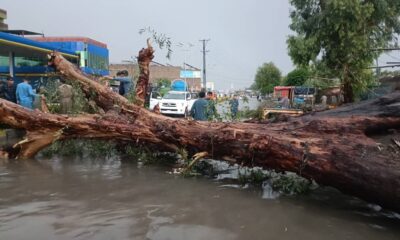
 Latest News5 days ago
Latest News5 days agoOne dead, dozens injured as powerful storm strikes Jalalabad, Afghanistan
-

 Latest News5 days ago
Latest News5 days agoEx-Afghan deputy speaker Qadeer back in Kenyan court for criminal case
-

 Health5 days ago
Health5 days agoJapanese charity Peshawar-Kai to resume leprosy treatment in Afghanistan
-

 Sport5 days ago
Sport5 days agoIndia suspends Indian Premier League T20 cricket tournament
-

 Latest News4 days ago
Latest News4 days agoPakistan says India launched attack on Afghanistan, India denies
-

 Latest News4 days ago
Latest News4 days agoMCC Chief: Afghan cadres sent to China for AI training
-

 World3 days ago
World3 days agoUS offers to help India and Pakistan start talks, G7 also urges dialogue




